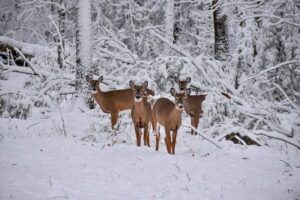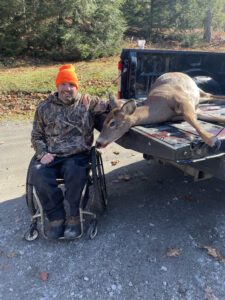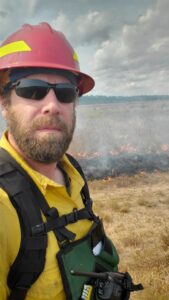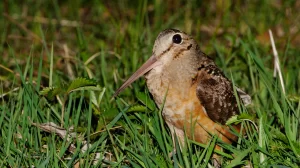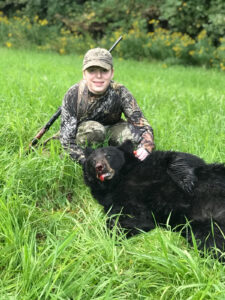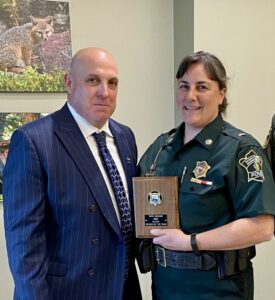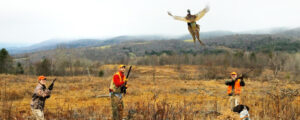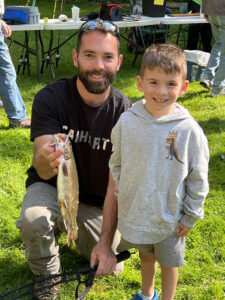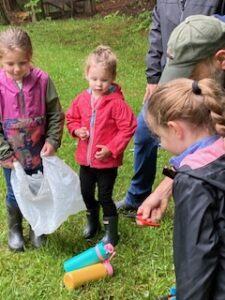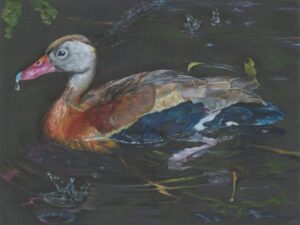Shotgun deer hunting season starts on Monday November 27 and it runs until December 9, (excluding Sundays). Two bucks can be harvested and if hunters are fortunate to have a valid antlerless deer permit (doe permit) they can also take a doe. Remember, the buck antlers must be at least 3 inches long.
Don’t forget, during the first week of the shotgun deer season (November 27–December 2), all harvested deer must be brought to a physical check station within 48 hours so MassWildlife biologists can collect biological data. Online harvest reporting is NOT available during this time. The Western District Check Stations are as follows:
- MassWildlife Headquarters – Dalton
- Lee Sportsman’s Club – Lee
- Mill River General Store – Mill River/New Marlborough
- Ernie’s Auto Sales – North Adams
- B&D Variety – Huntington
- Goshen General Store – Goshen
Shotgun, archery, and muzzleloader implements are allowed. Be sure you are familiar with all the deer hunting regulations listed on pages 26 through 29 of the abstracts.
Also, the shotgun (third) season for bear hunting opens on Monday and also runs through December 9. Regulations governing that season are listed on pages 30 and 31 of the abstracts.
During this week, hunters must wear 500 square inches of blaze orange on head, chest and back. If using a blind during the season or on a Wildlife Management Area with blaze orange requirements, all deer hunters must wear the required amount of orange while in the blind. MassWildlife recommends that blaze orange be visible on the outside of the blind, too.
If you plan to really get out there and traipse around our beautiful mountains, be sure to let people know where you are going to hunt and when you plan to get out of the woods. In addition to extra bullets, knife, drag rope, food and drink, etc., carry a fully charged cell phone with the numbers of those you are hunting with, a flashlight with extra batteries, maps and a first aid kit.
If your hair is turning a bit white, be realistic about your fitness and skill level. Don’t overestimate your abilities nor underestimate mother nature’s. Remember, breaking through fresh snow can be more tiring than regular hiking.
Hunter Harassment Law
Mass General Law, Part I, Title XIX, Chapter 131, Section 5C states “No person shall obstruct, interfere with or otherwise prevent the lawful taking of fish or wildlife by another at the locale where such activity is taking place”. It then lists 7 specific types of violations. “Environmental protection officers and other law enforcement officers with arrest powers shall be authorized to enforce the provisions of this section.”
Real cases of hunter harassment (meaning those that actually target specific hunters or their equipment and prevent, interfere or obstruct them from hunting) should be reported to Massachusetts Environmental Police statewide dispatch at 1-800-632-8075.
Precious Memories
Well, here we go again, another sleepless night thinking about opening day of shotgun deer hunting season. As usual, sleep will be out of the question and I’ll probably do the same thing I do every year……. toss and turn all night waiting for the 4:00 am alarm to go off. As usual, thoughts of previous opening days (and there were many) will undoubtedly cross my mind, one after another. I’ll remember the rainy, foggy, snowy, frigid days, who I hunted with, what gun I used, etc. I’ll remember the times I erred and allowed a big buck to get away. Yes, and remember a few nice deer that didn’t get away.
One such memory I will never forget occurred sometime in the late 1970’s. On that opening day, I was hunting with close friend Bob Stanard and Jack Landers both of Lee.
When we entered the woods in Beartown State Forest that morning, we agreed to meet at a certain location at noon. There we would eat our lunches, and if we hadn’t had any luck, plan our strategy for the afternoon hunt.
The place where we were to meet was on top of a ridge where we had prior luck shooting deer in the past. It was a little nook, in front of us, facing, west was a gradual slope to the rim of the ridge and then a sharp drop down the other side of the mountain toward Icy Glen in Stockbridge. Behind us was a small hill which dropped down to where we were. If we sat on a rock there, we were not able to look over the hill behind us. If we stood up and looked back, our eyes were almost level with the ground. (Kind of like looking out of a cellar window).
When Bob and I arrived at noon, we leaned our shotguns on a little tree 3 or 4 feet away from the rocks on which we sat. We got out our lunches and thermos bottles and while waiting for Jack, we lit up cigarettes (we smoked back then).
It wasn’t long before we heard the rustle of frozen leaves as Jack approached. When he was a short distance away, he appeared to have stopped walking, for we heard no more leaf rustling. We assumed that he was looking for an easy way to drop down to join us. After an unduly long period of silence, we looked back to see what he was doing.
There standing not 10 feet away looking down at us was a big buck. Both of us immediately jumped up to grab our shotguns, but it was too late. The buck immediately bounded off out of sight.
Jack joined us shortly thereafter and said that he never saw that deer which had to be in front of him all along.
I have relived that moment many times over the years, especially the night before opening days. I’m sure my wife Jan wonders what I am chuckling about in the middle of the night.
Manuel Carballo Governor’s Award
The Manuel Carballo Governor’s Award for Excellence in Public Service is presented to employees who selflessly personify a deep commitment to serving the people of the Commonwealth and exemplify the highest standards of public service. This award was established in memory of Manuel Carballo who served as Secretary of Health and Human Services. The award, in his name, is given to an employee, or group of employees, who demonstrate exemplary leadership, innovation, and creativity.
Recently, the Division of Fisheries and Wildlife (DFW) staff received recognition for the “Hunter’s Share-the-Harvest Program” and received that award. In his report to the MA Fish & Wildlife Board Meeting of November 15, DFW Director Mark Tisa noted that it shows the generosity of the hunting community to back and help, particularly with so many food insecurity needs that we have in the Commonwealth.
“It was great to have the Governor make that award and endorse the program” said Tisa. He then publicly recognized people that were instrumental in that program. They included DFW Western District Supervisor Andrew Madden and Western District Wildlife Biologist Nate Buckhout. “Its really a team effort and there are a lot of other employees, too” he said.
Fish & Wildlife Board elections
At that same November 15 Meeting, the Board unanimously re-elected the following officers: Stephen A. Sears of Dalton – Chairman, Bob Durand of Marlborough– Vice Chairman, and Ernest W. Foster of Scituate– Secretary. The other members of the Board are: Sasha Dyer of Barre, Emma Ellsworth of Orange, John Organ of Buckland and Matthew Sisk of Braintree.
Taconic TU Holiday Banquet
The Taconic Chapter of Trout Unlimited is having its Holiday Banquet on Thursday evening, December 7 at 6:30 pm at Mazzeo’s Ristorante, 1015 South Street, Pittsfield.
Billed as a great place to support the Chapter and get your holiday shopping done at the same time, there will be auctions and raffles which will include: fly rods, reels, guided fishing trips, flies tied by local fly tyers, waders, books and much more. (Someone will leave there with a bamboo flyrod, valued at around $1,200, made by the late legendary rod maker Richard “Digger” Degere of Adams).
Taconic Chapter’s highest award, the Crooked Staff, will be awarded to a deserving member who most represents the ideals of TU.
Tickets which include the meal cost $50 pp, can be purchased at https://www.paypal.com/pools/c/8ZkUSW5PSj or by check by emailing taconictu@gmail.com
You are urged to buy your ticket by December 1 so they can have a head count for Mazzeo’s.

